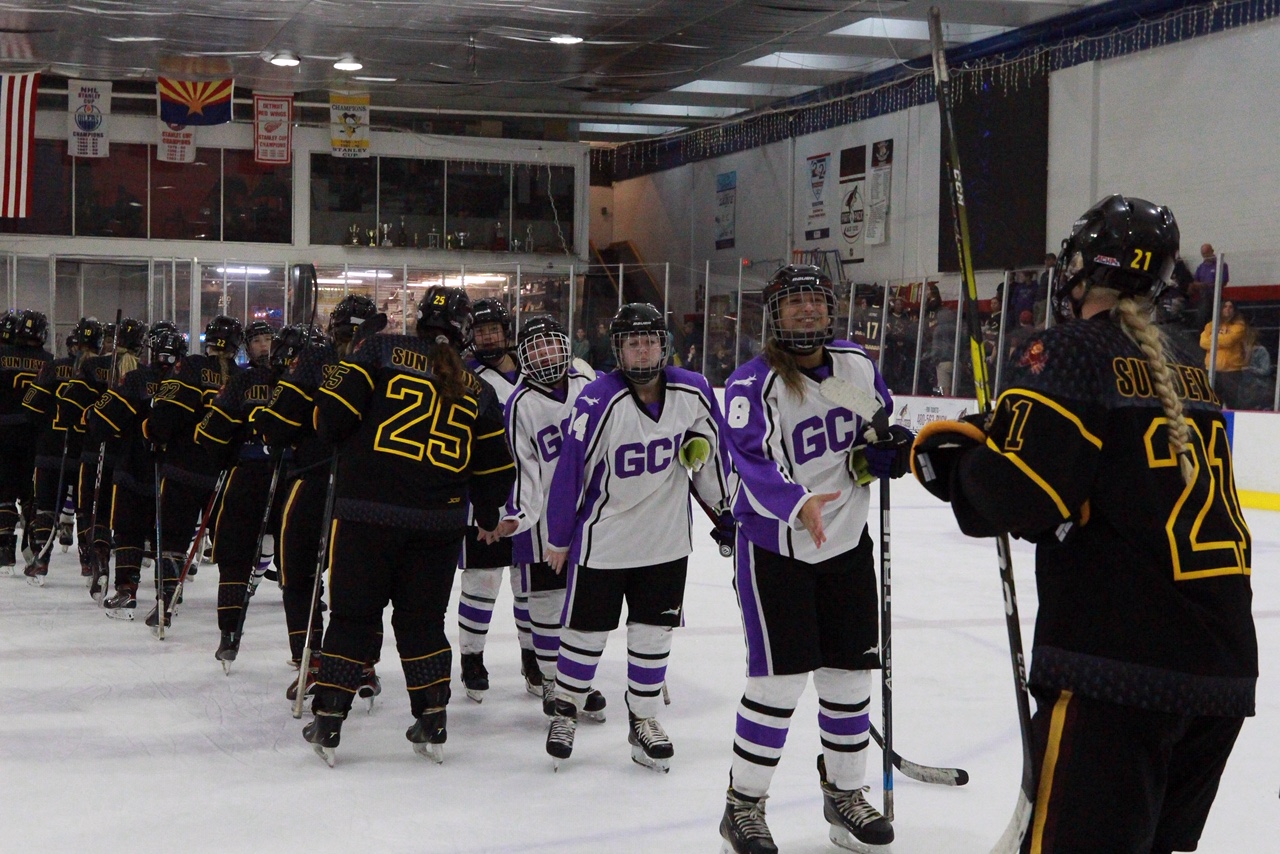(photo courtesy: Reagan Smith)
By Andrew Bell
Jordan Nash-Boulden is standing along a tight walkway behind the visiting team’s benches at AZ Ice Arcadia. She’s surrounded by teammates and her goaltending equipment with headphones on. She’s about two hours away from puck drop and standing between the goaltending posts for a start in net.
“We are in war mode,” Nash-Boulden says. “It’s game on.”
For about the next five hours, Nash-Boulden takes part in a rivalry that has intensified over the last three years. She is a senior goaltender on Arizona State’s women’s hockey team – a Division I club program that competes in the American Collegiate Hockey Association (ACHA). The team is in its fourth year of existence after being founded by head coach Lindsey Ellis.
The opponent that Nash-Boulden is at war with lies 16 miles away from her ASU campus. The Grand Canyon University women’s hockey team is hosting its opening night against the Sun Devils on October 4. The Lopes are led by head coach Natalie Rossi. They took the ice a year after ASU’s program was founded.
For the next two nights, the two programs go to battle – crosstown rivals lay it all on the line to hold bragging rights over one another while competing in college hockey. A packed house fills the arena, and young female hockey fans fill the bleachers with their eyes glued to the GCU and ASU sweaters on the ice.
“It’s hard to look out there and not be amazed and happy no matter what the outcome of the game is,” says ASU assistant coach Kaley Marino. “For little girls to be able to see these games and to see our atmosphere at ASU and GCU…It’s a great atmosphere for them to see, and to motivate them to keep playing.”
ASU wins both games against GCU, and the final horn sounds. Both teams shake hands, and then they become part of a bigger community. Because for as heated as the games are, players on both sides know there is a bigger picture. They are looking to develop the next generation of female hockey players in Arizona.
Various players from both GCU and ASU work as coaches for Lyndsey Fry’s Arizona Kachinas, which is an organization partnered with the Arizona Coyotes to develop girls hockey in the state.
Fry is a 2014 Olympic silver medalist. She played with Team USA’s national women’s hockey team. Originally from Chandler, she graduated from Harvard, where she played NCAA college hockey. She then earned her MBA in Marketing at ASU and is now back in her home state working as a Brand Ambassador with the Coyotes.
Fry has implemented the Kachinas program to develop female hockey, and with it, she has extended outreach to the two women’s college programs in the state.
Nash-Boulden is a specialty goaltending coach, and Rossi coaches with the 16U Elite program. Additionally, all of GCU’s players get USA Hockey coaching certified to help with youth programs and clinics. It’s just one way that Rossi’s team and ASU continue to give back and work toward a better future.
A big shout out to @Coyoteshckydev @BTMhockey and the @arizonakachinas for letting all of us at ASU be a part of your skates, pop-ups, and programs during Girls’ Hockey Weekend!
Proud to help #GrowTheGameAZ ?? pic.twitter.com/W9uTHfk6ae
— Jordan (@JoboTheGoalie) October 8, 2019
“On the ice, we are always going to be rivals with ASU. That’s just how it is,” said GCU junior forward Emily Martinho, who coached clinics and helped with IIHF World Girls Ice hockey weekend at AZ Ice Arcadia on Oct. 5. “But in these coaching clinics and on these teams, we can all come together as ASU and GCU and help these girls. They can look up to all of us.”
Lopes junior forward and captain Tuesday Chavez added to that point. Some of her players on the 12U team that she coaches brought signs to her game against ASU to cheer her on.
“This opportunity is the best job I’ve had,” Chavez said. “I never knew I could inspire a whole team to play for GCU or just to look up to GCU players…I love that I can affect people in a really good way.”
This season, you’ll be seeing a lot of our captain, @tuesdaychavez at the rink. She is giving back and helping grow the game as an assistant coach on the @arizonakachinas u12 team! Great job, Tuesday! #lopesup #growthegameaz pic.twitter.com/TKkpPfXFnt
— GCU Women’s Hockey (@GCUWomensHockey) September 3, 2019
Both sides of the rivalry share common ties. The Arizona hockey community is small, and it continues to grow at the same time. But for a few hours, and about four to five times a season, all of that is put in the backseat when it comes to the rivalry.
“When we are out there, we put it aside and everybody is your worst enemy for however many hours the game runs,” Nash-Boulden said. “But I don’t think there is too much animosity off the ice. The fact that we have all been coaching together over the summer, you get to know them outside of just playing for the other team…They are all people. They are all athletes, but when we are out there, we kind of throw that out the window for a little while.”
There’s perhaps no one better to comment on both programs’ impact more than GCU assistant coach KC McGinley.
A Scottsdale native, McGinley was ASU’s first-ever women’s hockey recruit, and she served as a captain for three seasons in maroon and gold. She played in the first two years of the crosstown rivalry.
Now she’s coaching for the program that she faced off against so often in college. She also works as an assistant with the Kachinas 19U Elite team. Regardless of what side she has been on as player or coach, McGinley has just one desire.
“My goal is to help grow youth hockey. I didn’t get this when I was growing up and the fact that these girls get this opportunity when I had to leave, I left the state when I was 16 to keep playing,” said McGinley, who originally started her collegiate career at an NCAA school in Massachusetts before transferring to ASU once the women’s hockey program was founded. “They don’t have to do that anymore, and that’s what it’s all about.”
For now, ASU holds the edge in wins over GCU in the rivalry’s all-time series. The two sides play each other three more times this season. And with more matchups, they will have more young female hockey players as onlookers.
Whether they are players or coaches, the future of women’s hockey in Arizona is strong with the college programs helping to shape the landscape and set an example.
“These girls get to see GCU and ASU play against each other and be like, ‘I can do that,’” McGinley said. “That’s such a realistic goal for them and it’s so cool to have those built-in mentors in their home state. It gives them these idols, and these girls that are real and they are here in Arizona. It’s not like looking up to the Arizona Coyotes. You don’t have to look up to the boys.”
Related posts:
 It’s about Time! ASU – GCU Agree to Basketball Series
It’s about Time! ASU – GCU Agree to Basketball Series

(AP Photo/Morry Gash)
NCAA Pulls the Plug on March Madness
Courtesy: Bill Wuneburger
ASU Women’s Hockey reaches donation goal, heads to 2023 ACHA DI National Championships GCU Men’s Volleyball Makes NCAA Tournament For The First Time In Program History
GCU Men’s Volleyball Makes NCAA Tournament For The First Time In Program History

